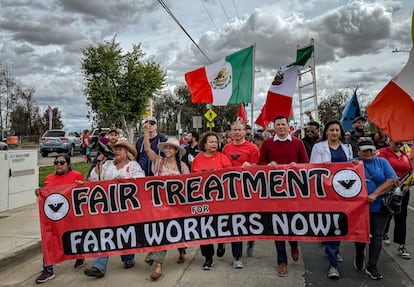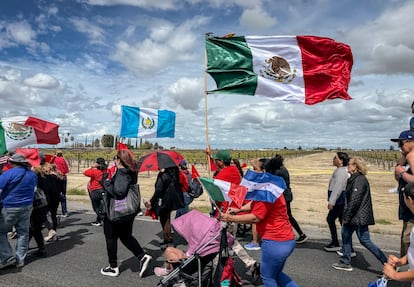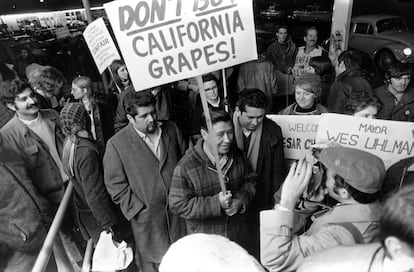Farm workers mobilize against Trump: ‘It’s important to teach people who are afraid that they have to fight back’
Some 7,000 people marched in California to mark the legacy of resistance and struggle of union leader César Chávez


Miguel Palafox describes himself as an optimist. This farmworker doesn’t rule out amnesty for undocumented immigrants like himself. He hasn’t lost hope, even in the bitter times of Donald Trump. Living in the United States since 1989, the 47-year-old still has faith in being reunited with his father, whom he hasn’t seen since leaving his village in the Mexican state of Veracruz. He has had a work permit for 11 years, but hasn’t left the country for fear of never being able to return. On March 31, despite the persecution faced by people like him, he marched for the first time. “I won’t say I’m not afraid, but I think it’s important to do so,” says Palafox, who picks citrus fruit in California’s Central Valley.
Palafox took to the streets of Delano, a farming town 140 miles north of Los Angeles, on Monday, alongside thousands of others. It’s a significant town for Latinos in the country, as the legend of César Chávez — the United Farm Workers (UFW) leader who became a figurehead in the 1960s in defense of undocumented workers, a population now under threat from Trump’s policies — was forged in these lands.
“In the face of all these attacks, it’s important to teach people who are afraid that they have to fight back. We have to encourage the people to protect their rights,” says Paul Chávez, one of the eight children of the union leader, who died in 1993. Chávez’s legacy is so significant that his birthday, March 31, was declared a holiday by Barack Obama in 2014. It is a mandatory holiday in California. “We decided to honor his birthday with a big protest, a march to announce to everyone that we are here and that we are going to fight against Trump and his henchmen,” says Paul Chávez.
The protest drew some 7,000 people, according to organizers. It was a three-mile march from a public park to the Forty Acres Ranch, the first UFW headquarters and where César Chávez held his first fast in 1968. Some 50,000 people made this same journey in April 1993 to bid farewell to the charismatic union leader when he died in his sleep at the age of 66 in Arizona. Historians consider it one of the largest funerals for a union leader in the United States.

Monday’s demonstration, however, moved the community in other ways. Verónica Tapia and several of her neighbors left their homes to record the protest with their cell phones, filled with flags from Mexico, El Salvador, Guatemala, and the Philippines, a nation allied with Chávez’s labor movement. “I haven’t seen such a large march in years. It gives me goosebumps,” says Tapia, who couldn’t hold back her tears.
This land, Kern County, has become a battleground. At the beginning of the year, a raid heralded the change of era. A group of Border Patrol agents, over 300 miles away from their base of operations, improvised an operation in the area without the knowledge of their supervisors to demand documentation from farmworkers. This resulted in the arrests of 78 people, many of whom were processed for deportation. It was the final hours of Joe Biden’s presidency, and activists claim the operation was carried out with the sole purpose of announcing what was around the corner.
Then came the chaos of Trump and a migrant hunt that has touched almost every corner of the country. Alfredo Juárez, who worked with Familias Unidas organization, was arrested in Washington state by ICE agents while dropping his partner off at work. The officers smashed the car window and forcibly removed the 25-year-old, claiming that an immigration judge had ordered his deportation to Mexico in 2018 and he was not cooperating with the arrest. Today, he is in a Tacoma detention center. The local press emphasizes that the only blemish on his record was a traffic violation committed a decade ago.
“He was a very important voice in the community, speaking out about workers’ rights. It’s an injustice because he didn’t do anything wrong,” says Teresa Romero, the UFW president. “That’s what they want to do: take away our voice, our strength… to make us afraid,” adds Romero, who received one of the U.S. government’s highest civilian awards from Joe Biden.

Alfred Valenzuela attended the march with several photographs of his older brother, Frank Tito Valenzuela, who died in 2024 at the age of 91. In one of them, Tito appeared beaten and handcuffed by Kern County police after a 1973 demonstration at the Giumarra Ranch, a Bakersfield vineyard affected by the grape harvest strike, one of the UFW’s most iconic moments. “That’s how they left him for defending a pregnant woman who was being beaten by the police,” Alfred, who came from Hollister, proudly recounted.
The Delano police are no longer a threat. Their officers greeted protesters on Monday. Some officers took videos of the large march. Alfred Valenzuela says the atmosphere was festive: nothing like the protests he attended decades ago with his brother. “Today, this demonstration is full of children and people with rights. But those freedoms and rights must continue to be defended in the streets. We cannot lose hope, not even now,” he asserts.
Sign up for our weekly newsletter to get more English-language news coverage from EL PAÍS USA Edition
Tu suscripción se está usando en otro dispositivo
¿Quieres añadir otro usuario a tu suscripción?
Si continúas leyendo en este dispositivo, no se podrá leer en el otro.
FlechaTu suscripción se está usando en otro dispositivo y solo puedes acceder a EL PAÍS desde un dispositivo a la vez.
Si quieres compartir tu cuenta, cambia tu suscripción a la modalidad Premium, así podrás añadir otro usuario. Cada uno accederá con su propia cuenta de email, lo que os permitirá personalizar vuestra experiencia en EL PAÍS.
¿Tienes una suscripción de empresa? Accede aquí para contratar más cuentas.
En el caso de no saber quién está usando tu cuenta, te recomendamos cambiar tu contraseña aquí.
Si decides continuar compartiendo tu cuenta, este mensaje se mostrará en tu dispositivo y en el de la otra persona que está usando tu cuenta de forma indefinida, afectando a tu experiencia de lectura. Puedes consultar aquí los términos y condiciones de la suscripción digital.








































